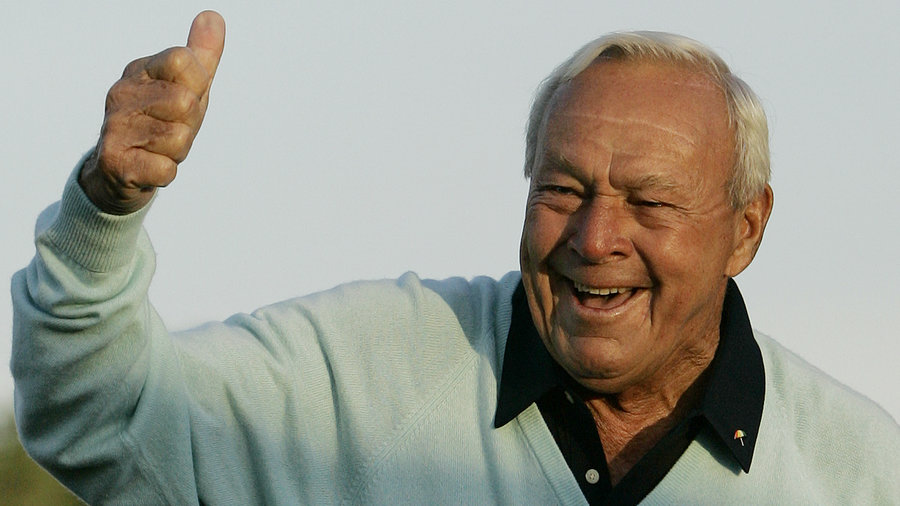
“The golf course is a place where character reveals itself.”
There is an old adage that says sport does not instill character, sport reveals character. Nowhere is this truer than in the game of golf. Golf can be a trying game. Professionals hit major slumps that sometimes end their careers. Perhaps a swing is off or maybe the putts just don’t go in. These personal challenges can last an 18-hole round, a weekend, or a year. Amateurs and professionals alike are not immune to the frustrations of the game and the negative aspects that golf reveals. Arnold Palmer’s five-decade career revealed the true nature of his character, which is deeply rooted in courtesy, passion, determination, discipline and modesty.
The origin of Palmer’s skill as a golfer and his character as a man can both be traced back to his father. Palmer’s father was a head professional and greenskeeper at Latrobe Country Club in Pennsylvania. Palmer accompanied his dad to the course from a young age and began golfing at age 3. Everything he knew about being a good golfer and a good man came from his dad. “He didn’t just teach me to play golf, he taught me a discipline that things should be done a certain way – as well and as hard as you can,” recalled Palmer.
A decade before his professional career began, he learned just how not to conduct himself on the golf course. At one point in the finals of a junior match, Palmer missed a putt and threw his putter. He went on to win the match, but he received no praise on the way home. His father instead warned him that if he ever threw a club again, he would never play in another golf tournament. “To Pap, there was nothing worse than a poor loser – except being an ungracious winner,” said Palmer. He took those lessons about good sportsmanship and applied them to his entire life. “That way, win or lose, I knew that I was going to do the right thing,” said Palmer.
Arnold Palmer’s professional golf career began in 1955 and he went on to win 62 PGA tournaments, including seven majors (4 Masters, 1 U.S. Open, and 2 British Opens). Palmer had an epic following in part because television was new in the 1950s, and with his success in televised golf matches, he became a household name and face. Until then, golf had been described as a “sleepy country club game” not appreciated by the masses. Because Arnold Palmer came across to everyone as a down-to-earth, regular guy he changed this perception. It was no longer a rich country club man’s sport. Accordingly, golf became more appealing across all social classes.
Of course, Palmer’s goal as a professional golfer was to win golf tournaments and he did. However, some of his most defining moments didn’t come in those victories. During an invitational in 1962, a small boy created a disturbance first by laughing and then by crying. This boy broke the cardinal rule in golf of providing silence before a shot. Palmer backed off his shot three times. He turned toward the voice to see the mother firmly grasping her hand over the child’s mouth. Palmer quietly said, “Hey, it’s okay. Don’t choke him. This isn’t that important.” He then went on to hit the ball and win the tournament. Palmer later said, “I was just reacting in a way that fit my philosophy. For a lot of players, golf is a way of making a living. For me, golf has always been a way of being alive. I never felt like I had to win at all costs.”
Palmer’s ever-present masses of fans became known as “Arnie’s Army” and he was always gracious with them. Fellow golfer, Raymond Floyd, said that Palmer “set the standard for how superstars in every sport ought to be, for example, in how he had always signed autographs, and had always made time for everyone.”
Arnold Palmer was a model to emulate for the many great golfers who would one day follow him in major (and nationally televised) tournaments. As years went on, Palmer became a mentor for the younger golf stars for whom he had paved the way. He counseled Curtis Strange and Tiger Woods, among others, on the pressures of fame. In so doing he took on the role of golf’s elder-statesman, and he passed along the advice that his father surely would have given.
“I’ve always tried to tell the younger guys that, if they want the perks of stardom, they have to accept the responsibilities too. Everyone wants to make the money, to be adored… but you can’t go through life taking. At some point, you have to give.”
Because of his success on the golf course, and his poise and character both on and off of it, Palmer was given an enduring nickname — “The King” — a moniker he never liked. Palmer didn’t feel there could ever be a king of golf. He knew the game could be as brutal as it could be rewarding for all players of the game. He also didn’t want to be known just for winning. “How I prefer to be thought of in terms of my legacy – as a caretaker of the game, just the way my father was before me. Someone who tried to preserve it, nurture it, and improve it if he could.”
According to Adam Schupak of Golf Week, Palmer’s legacy can be drilled down to something simpler. “Quite simply, he made golf cool,” said Schupak. Palmer’s response to this again shows his “moral excellence” with how humble he remained.
“I never thought of myself as cool, even when people were saying that I was cool…And I never did anything intentionally to seem cool. My mother and father taught me from the beginning that there is no point in being anything other than yourself. People will find you out eventually, and discover who you really are, if you are putting on an act. So, I didn’t.”
Jack Nicklaus, the man recognized as the greatest golfer of all time, said the following about his life-long rival and friend: “Arnold transcended the game of golf. He was more than a golfer or even a great golfer. He was an icon. He was a legend. Arnold was someone who was a pioneer in his sport. He took the game from one level to a higher level, virtually by himself.”
Even after Arnold Palmer had been retired for forty years he remained a trusted image and name — because he had always done things with integrity and in “just the right way”. So major companies continued to pay him millions of dollars to represent their products. He started businesses and designed more than 300 golf courses all over the world. He established charities that gave away millions of dollars. He was one of the 13 original members inducted into the World Golf Hall of Fame. His popularity helped develop the Senior PGA Tour and he played a role in making the Golf Channel a reality. You can also go into just about any restaurant in the world and order an “Arnold Palmer”, and your server will provide you with a glass filled equally with iced tea and lemonade.
Arnold Palmer left us in 2016 at the age of 87. Palmer lived a long, fulfilling life. He left behind a golf legacy second to none. He was a friend to celebrities and presidents. His charitable endeavors will continue to impact lives long after his ended. He was an ambassador for the game, bringing it to the masses. “And I hope I have set an example for everyone who loves the game to be an ambassador of sorts too. Because we all have a responsibility to make sure this great game remains great,” he said. He aimed to be a great golfer and he always tried to be a positive role model. “My father drilled into me the importance of always leaving the golf course better than I found it,” said Palmer. The lesson was learned. Palmer left the game of golf and the world better than he found them.
Check out the Student Athlete ProgramArnold Palmer is one of the 144 “Wednesday Role Models” featured in the Student Athlete Program. This program is designed to improve the character, leadership and sportsmanship of high school athletes. To learn more about this program and how you can implement it in your school:
